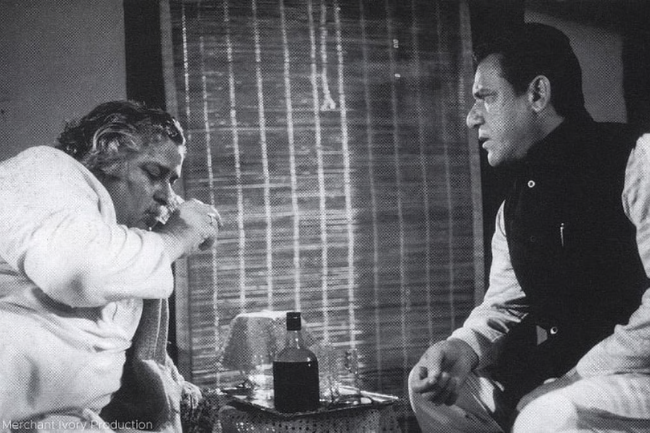Ismail Merchant’s directorial debut, “In Custody,” also called “Muhafiz,” marks a significant shift from his renowned producing career with Merchant Ivory Productions. Released in 1993 in Urdu with English subtitles, the film is an adaptation of Anita Desai’s novel of the same name. It explores the cultural and linguistic heritage along with decay in human relationships and the disappointments of life.
The Story And Treatment
The narrative centres on Deven Sharma (Om Puri), a timid Hindi professor in Mirpur, lured by his friend Murad (Tinnu Anand) to interview Nur Shahjehanabadi (Shashi Kapoor), a fading Urdu poet. Deven seeks escape from his mundane life but finds Nur surrounded by chaos—drunken admirers, jealous wives, and personal decline. The plot unfolds as a comedy of errors, with Deven becoming the reluctant custodian of Nur’s final poems. Deven, who was the lifelong admirer of Nur’s work, finds the man in a pitiable condition, a far cry from his literary genius.

Merchant directs with a focus on character depth and balances subtle humour and melancholy to reflect Deven’s internal struggle. He emphasises dialogue-driven scenes and avoids the visual flair. The film adopts a semi-realistic treatment, rooted in Desai’s novel. Merchant infuses a gentle satire, highlighting the clash between tradition and modernity.
The portrayal of Urdu’s decline serves as a backdrop, treated with respect yet critiqued through Nur’s decadent lifestyle. The narrative avoids heavy-handedness, opting for nuanced character interactions.
Performances
Shashi Kapoor delivers a commanding performance as Nur, blending grandeur with vulnerability. His portrayal of a poet past his prime earns a National Award Special Jury mention. Om Puri excels as Deven, conveying quiet desperation with subtle expressions. Sushma Seth as the older wife of Nur was an absolute delight. Shabana Azmi, as Nur’s second wife, Imtiaz Begum, adds intensity that only she can deliver. The ensemble cast, which consists of Parikshat Sahni, Amjad Khan, Neena Gupta, and Tinnu Anand, enhances the film’s layered dynamics.
The production relies on modest budgets, typical of Merchant’s style. Sets depict vibrant bazaars and Nur’s shabby mansion, filmed in Bhopal. The film uses natural lighting to maintain authenticity, avoiding artificial gloss. Roberto Silvi handles editing with smooth cuts and transitions. The pacing remains deliberate, allowing scenes to breathe. The costumes by Loveleen Bains were lauded for their authenticity.
Technical Aspects
Larry Pizer’s cinematography captures vivid details—crowded markets, dusty roads, and flower-filled courtyards. Wide shots establish settings, while close-ups reveal character emotions. The camera moves sparingly, emphasising static compositions that mirror Deven’s stagnation. The colours of the film remain subdued and dull to reflect the mood of the film. The decaying building, broken doors and dimly lit rooms perfectly represent the setting for the depressing tone of the film.
The screenplay and dialogue, written by Anita Desai and Shahrukh Husain, blend poetry with everyday speech. English terms like “TV” and “VCR” punctuate the script, signalling modernity’s encroachment. The Urdu lines, delivered with precision, carry cultural weight, while Hindi interactions add accessibility.
The Music
Zakir Hussain and Ustad Sultan Khan compose the score, featuring tabla and sarangi. The music underscores ghazals and poems by Faiz Ahmed Faiz, enhancing the authenticity of the film’s central narrative. Faiz’s poetry is used throughout the film as Nur’s words. The use of those selective words is the highlight of the whole film and is used very wisely and beautifully to great effect. Songs are sparse but impactful, woven into scenes to reflect Nur’s poetic legacy. The minimalist approach complements the film’s mood, avoiding over-dramatisation.
In Custody – A Piece Of Art
“In Custody” stands out as Merchant’s only directorial venture under Merchant Ivory Productions. Its Urdu language choice, rare for Indian cinema, highlights a dying literary tradition. The blend of comedy and tragedy, paired with a focus on poetry, sets it apart from typical narratives.
The film explores the decline of Urdu poetry and Urdu as a whole amid Hindi dominance, reflecting linguistic identity. It addresses personal ambition versus societal expectations through Deven’s journey. The clash between tradition and modernity emerges in Nur’s lifestyle and the urban-rural divide. Gender dynamics surface through Imtiaz’s rivalry, critiquing patriarchal norms.
Critics praised “In Custody” for its cultural insight and performances, though some found it slow-paced. The New York Times lauded its backdrop and character depth but noted its niche appeal. Commercially, it struggled, failing to attract mainstream audiences due to its language and arthouse style.
The film won the National Film Award for Best Production Design in 1993. Shashi Kapoor received a Special Jury Award for his role. Suresh Sawant also won the National Award for Best Art Direction. The film was also selected for the Tokyo Film Festival.
The film has, over the years, achieved a cult following. Shashi Kapoor’s performance is widely believed to be his finest. “In Custody” showcases Ismail Merchant’s directorial skill, blending a compelling story with strong performances. Ismail Merchant shot the film in Bhopal to capture authentic settings, avoiding studio sets. He drew inspiration from Munshi Premchand’s realism, influencing the script. Its technical aspects, editing, and cinematography support a unique narrative on Urdu’s decline.
In Custody on IMDB